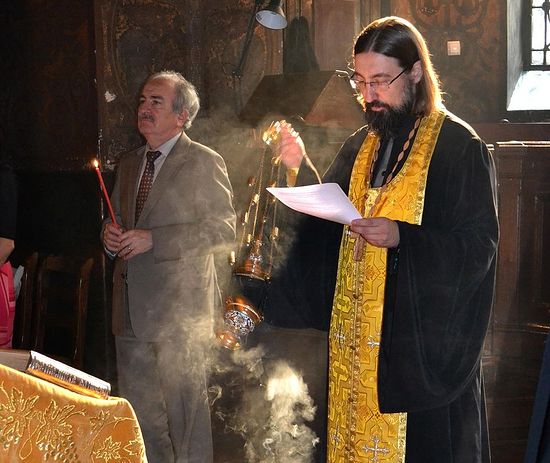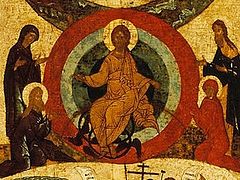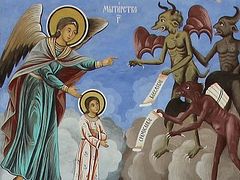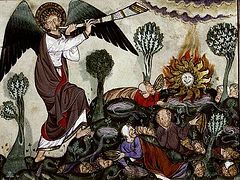How can we help our loved ones who have departed this life? Hieromonk Job (Gumerov) talks about the commemoration of the dead.
According to Orthodox teaching, through the prayers of the Church the dead can receive relief or freedom from their punishments beyond the grave. “Anyone who wishes to show his love for those who have died and give them real help can do this in the best way by praying for them, and especially by commemoration at the Liturgy, when a particle removed [from the prosphora, or communion bread] for the living and the dead is immersed in the Blood of the Lord with the words, ‘O Lord, take away the sins of those whom we commemorate here by Thy precious Blood, through the prayers of Thy saints’” (St. John [Maximovich], Life afer Death.)
In keeping with this the Church has established special services:
-
Prayers commemorating the dead at Divine Liturgy (at the proskomedia, after the sanctification of the Holy Gifts, and at the litany for the dead).
-
Pannikhidas and litias
-
Reading of the Psalter
In order of significance, the commemoration at the proskomedia and after the sanctification of the Holy Gifts stands above the rest. The outstanding expert in Church service rubrics St. Athanasius (Sakharov) writes, “The commemoration of the living and the reposed at the proskomedia and after the sanctification of the Gifts, albeit unspoken, for its significance, power, and effectiveness cannot be compared with any other commemoration prayers—prayers for the living, Pannikhidas, or any other pious labors in memory of the living or the dead. It cannot be compared with spoken commemoration at the same Liturgy at the great and augmented litanies (which are allowed in some places) and at the special litanies for the reposed” (On the commemoration of the dead according to the rubrics of the Orthodox Church).
At every proskomedia, one of the prosphora used in the service (the fifth, in the Russian practice) is offered particularly for the dead. It is necessary to regularly give lists of names at the proskomedia. We can also order daily commemorations at the Liturgy for forty days, a half-year, or a year.
The Church has established special commemorative Saturdays, which have been named ancestor Saturdays: Before Meatfare Sunday (that is, before the fast-free Cheesefare week), before the feast of the Holy Trinity (Pentecost), before the day of St. Demetrios of Thessalonica, and on the second, third, and fourth Saturdays of Great Lent. Every Orthodox Christian should strive to fulfill his duty before his parents and other departed relatives and submit lists of names at the Liturgy and Pannikhida served on these days. “Pannikhida” (Greek: pan—“all” and nikh—“night”) literally means “all night service”. This name is given to the prayer service for the reposed because its composition resembles a part of the All-Night Vigil service, and also because in the early days of the Church, during the time of persecutions, it was served at night, like the All-Night Vigil. Any [Orthodox] person can order a Pannikhida for his departed relatives. This is most often ordered on days that are special for the reposed persons (their name days or anniversary of their day of death).
Sometimes people want to know why we [at Sretenky Monastery] ask not to submit long lists. This is only because the serving priest’s possibilities are very limited. He has to commemorate hundreds and hundreds (on feast days over a thousand) names at the proskomedia, which lasts only 30–40 minutes. During this time he must also commemorate those names written in the church’s synodic (commemoration books for the living and the dead). If he were to commemorate them all at the litany, it would take up a third of the Liturgy, which would disrupt the good order of the service. Those who wish to commemorate their relatives can do so themselves during the time that the priest is serving the proskomedia by reading their own commemoration books. The brother of St. Nikon (Belyaev), John, when he was a novice with St. Barsanuphius, recalled that in the Optina Skete of St. John the Forerunner there were huge commemoration books in which were entered the names of benefactor and their families for many decades. Strictly according to the rule, in the altar there would be only the serving priest, a hierodeacon, and a sexton. The elders blessed all the brothers to read the commemoration books not in the altar but in the church, while the proskomedia was being served. He writes that earlier he would submit lists of names, but later he also began reading them during the proskomedia. So also can any person in church read commemoration lists that were not submitted due to the large number of names. We have to believe that the merciful Lord, Who sees our circumstances, will accept this prayerful request for the living and the dead. We can also read our prayer books while the priest or deacon is pronouncing the litany for the living and the dead.
From deep antiquity there has also been the tradition of commemorating at home. Those who want to fulfill their duty before their reposed relatives can regularly read the Psalter. Some read a kathisma every day, others with a specific regularity. The commemoration of the living and the dead is also a part of the Morning Prayer rule.
Close relatives of the reposed (especially children and grandchildren, i.e, immediate family) have the great opportunity to help their departed ancestors—to manifest fruits of spiritual life (to live in the prayerful experience of the Church, participate in the holy Sacraments, to live according to Christ’s commandments). Although our ancestor may not have grown these fruits themselves, but their children and grandchildren did, they (the departed ancestors) are participants in these fruits as the root or trunk of the tree. Just how great this help is even for relatives who lived outside the Church we know from the letters of St. Ambrose of Optina to Count Alexei P. Tolstoy. A mullah was baptized in his house church. The great elder wrote on this occasion, “The baptism of this mullah, the conversion to Christianity of the Lezgin [a nation in the Caucasus Mountains] Assan, the reception into the Church of an Abyssinian, and several similar examples has given us the thought that God also honors various tribes and peoples with various errors relative to the one true Divinity; because although it happens rarely, from almost all existing tribes in different times people have converted to true Christianity… This means that if out of the darkness of impiety one has turned to the Lord, then this is sufficient for the Lord; and for the sake of this one convert, He will honor the whole generation [i.e., lineage] that produced him” (Collected Letters [Moscow, 1995], 7).
“The lot of the departed is not considered decided until the general Last Judgment. Until then, we cannot consider anyone as finally judged; and on the basis of this we pray, convinced in our hope in God’s immeasurable mercy!” (St. Theophan the Recluse, Collected Letters, v. 6, letter 948).





I belong to the Indian (Malankara) Orthodox Church,London The question is "Does the departed souls have any influence on the living OR When they attend the Holy Communion with us can we request anything to them"...??
Thank you, a reply very much appreciated !